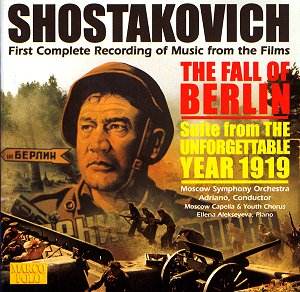What have we here? Russian film music by Shostakovich.
Two scores from the thirty-five he produced for the cinema industry
between 1929 and 1970. This is the first recording of the complete score
for The Fall of Berlin which Gauk conducted as a five
movement suite for a Melodiya LP in 1952. We also hear the much
shorter first complete recording of the suite from The Unforgettable
Year 1919. The suite was recorded on LP by Alexander Gauk in 1956
minus the Assault movement (a pocket piano concerto) and the
Intermezzo. You might remember the 'piano concerto' which is
a sort of super concise version of Addinsell's Warsaw Concerto.
It was the filler on Dimitri Alexeev's Classics for Pleasure LP (later
CD) with the two Shostakovich piano concertos. The 1919 suite
was prepared by Shostakovich's close friend, Levon Atovmyan.
The films each interleave a re-creation of history
(war and insurrection) with a story of love and friendship. History,
relentless and heroic and propagandised (though probably no more than
by Hollywood), is thrown into some relief by the lives of ordinary people
caught up in or trodden down by events. In fact the two spheres are
complementary; there was no room for satire or personal dissent.
The Fall of Berlin music has its share of conventional
gestures but certain tracks stand out. Beautiful Day and Stalin
at Berlin Airport are brightly and forwardly sung (trs. 2 and 15).
Alyosha by the River is magically hushed. Several times it seemed
that the composer was looking back to Beethoven's Pastoral (trs.
2, 5). A feint in the direction of symphonic gravity can be heard
in In the Devastated Village and The final battle (trs.7
and 13) looking towards symphonies 7, 8, 10, 11 and 12. More often than
not the composer borrows familiar gestures from Borodin (Second Symphony)
as in Main Title Part 2 and Storming Seelov Heights (tr.
9, 11) and from Rimsky-Korsakov in The final battle (tr. 13).
Waxman, Rózsa, Steiner and John Williams have
written bumptiously regal music and Shostakovich pulls off the same
trick in the Finale of the Berlin score and in the Tsarist preening
of the Introduction of 1919. The 1919 score is
not quite as unforgettable as the year it was meant to portray. Here
the references are again to Razliv, Tchaikovsky and steppe-loneliness
Slav gestures whether in gloomy reflection or hussar charges redolent
of Miaskovsky (tr.23 1.47).
Can we now implore Marco Polo and Adriano to record
as much as possible of Ovchinnikov's score for War and Peace?
A DVD series of the Shostakovich and Prokofiev films would be welcome
too.
If this is not quite essential Shostakovich it makes
a self-recommending acquisition for any DSCH student. Superbly produced
and executed by Adriano, Marco Polo, the Moscow Orchestra and the Moscow
recording team.
Rob Barnett
TRACK TITLES
The Fall of Berlin
Main title Part I
Beautiful Day
Alyosha by the river
Stalin's Garden
Alyosha and Natalia in the fields - Attack
Hitler's reception
In the devastated village
Forward!
Main Title - Part II
The roll call - Attack at night
Storming Seelov Heights (Zielone Gora)
The flooding of the underground station
The final battle for the Reichstag - Kostya's Death
Yussuf's death - The Red Banner
Stalin at Berlin Airport
Finale: Stalin's speech - Alyosha and Natasha reunited
The Unforgettable Year 1919
Introduction
Romance (Meeting of Shibayev with Katya)
Scene from the Sea Battle
Scherzo
The Assault on the Red Hill
Intermezzo
Finale
